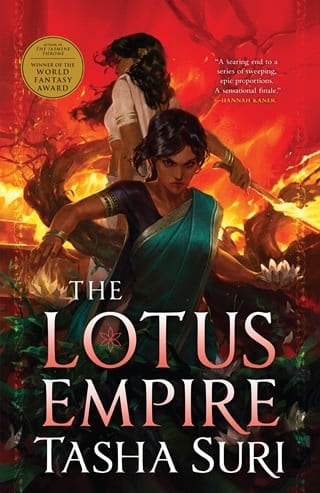Chapter 2 Malini
MALINI
Every night she returned to the court of the imperial mahal. She could not help it. Her dreams carried her there.
Every night was the same. Blue stone beneath her, the light of an unseen moon veiling the white marble, the pale sandstone, in water-deep shades. The gold of a fire ahead of her, blooming into flowers. Marigolds and ashoka and roses of bloody red, tumbling from the flames to her feet. And there, waiting for her, always: Priya.
Priya with leaves falling softly from her tangled hair. Priya, weeping—tracks of fire glittering on her cheeks.
Priya sliding a knife through Malini’s ribs.
Malini woke, as she always did, with a sharp pain burrowing its way through her chest. She kept her eyes closed for a long moment, then rose to her feet. Removed her blouse with careful fingers. Pressed her fingertips to her own skin.
Smooth flesh first, and then the scars: the roughness of them, ugly beneath her fingers, a rope of hurt flesh knotted anew.
Touching the scars reminded her the knife was gone. Priya was gone. There was no reason at all for the pain.
She lay back down. Chest throbbing. A door open in her skull, a fire and a knife at the end of it.
The sun rose on the day of Aditya’s funeral. She’d half expected that it would not.
The sky was still rose-pale when maids dragged buckets of fire-heated water into the marble bathing room, pouring them into the bath. Malini followed after them, slow-footed, heavy-hearted.
She lowered herself into the deep well of the bath, the water scalding around her, so hot it made her skin sting and ache. She closed her eyes, breathing the steam in as one maid poured oil into the water and another gathered up her hair, working through the tangles with an ivory comb and jasmine oil.
The maids moved silently. The smell of flower attar, even diluted, was nearly overpowering. But even so, when Malini rose out of the pool, she dipped her hand into the jug still held in a maid’s waiting hands and pressed the fragrant oil behind her ear.
She knew how strong a pyre smelled. Better to smell flowers than fire, if she had the choice.
A drying cloth was wrapped around her body, her hair carefully daubed dry and then bound into a braid. No flowers in her hair today. No jewels at her wrists or her nose, her ears or throat. The sari that the maids wound around her body was pure mourning white.
Her chest ached as she moved at her maids’ gentle urging. Pulled and tugged, the tight, scarred skin resisted her movements. The pain was all the greater because she refused to distract herself from it. Instead, she focused resolutely on her own body: the sweat already threatening to rise to her skin, the fading heat of the water, the scent of jasmine, and the ever-present ache within her ribs.
Funerals were meant to be performed as soon after a death as possible: the body burned, prayers made, mourning begun. But Aditya’s funeral was no normal funeral. He had sacrificed himself for the empire. In the heart of a fort in Saketa, he had chosen to die.
Aditya had burned as the mothers burned. Aditya had smiled, or so people said—smiled and made the warriors around him vow to serve her, before the flames had consumed him whole.
Empress Malini , one of those warriors had said, head bowed. In death, he gave you an everlasting crown.
She let out a shuddering breath, tears threatening at her eyes. One of her maids made a high-pitched sound, resonant sympathy, her hands fluttering. She settled on adjusting Malini’s pallu.
Strange to cry, when her heart felt so leaden inside her. Sometimes grief was pain, and sometimes it was simply absence—the wound in the shape of things that could not be felt or touched or comprehended.
A figure entered. Malini turned and saw Lata standing in the doorway, white-garbed and solemn.
“It’s time,” Lata said.
In the first hall stood Deepa and Raziya, and a whole throng of highborn dressed in uniform white. Some were already weeping. But Raziya was dry-eyed. She met Malini’s eyes for a moment, then bowed—one sweeping movement mimicked in a ripple by the women around her.
Malini waited until they rose from their bows. The leaden feeling had spread from her heart to the rest of her body. She was not sure she could move her legs. But she had to. There was no alternative.
One step, then another. Another. And her court of women followed her, skirts whispering, a rustle like birds seeking flight.
She walked from her chambers, out, out.
And there, waiting for her, was a sea of highborn men. Her lords and kings. The rulers of her empire.
They bowed, too.
Through the throng of them, the High Priest emerged. Hemanth was the head of the priesthood that served the mothers of flame, and by extension served her. He was meant to be her spiritual advisor, by stature and standing.
But he was also the man who made Chandra into what Chandra had been. He was also the man who had burned women. The man who had almost burned her.
“Empress,” Hemanth said. She could not read his expression. But she counted the new lines of grief and tension around his mouth. Noted the redness of his eyes. He was suffering, at least, and that pleased her. “Prince Aditya’s soul awaits our prayers.”
Distantly, through the high windows and from remote corridors, she could hear weeping and song. Prayer and music, and the beating of mourning drums. Would the mourning have been so ostentatious if the rot was not flowering across the empire, if rumors of the yaksa rising and walking once more had not begun to spread? People needed something to have faith in.
“High Priest,” she said, loud enough for the waiting men to hear her. Her voice was clear as a bell. “Show us how to revere him.”
Chandra’s funeral had not been like this. It had been swift, and small. Ignoble. No one had been willing to burn his corpse during her sickness, and by the time she had recovered from her wound his body had rotted. Even the flowers and perfumes laid on his pyre, and the attar of roses dashed from small silver filigree jugs by the priests onto his remains, had not been enough to cover the smell. So there had been no public display of mourning for the people of Harsinghar to wail or cheer over. Instead, there had only been members of her council and the priests, and Malini herself. And the corpse, of course, swathed in white cloth to conceal its decay.
But for Aditya’s funeral there was weeping and wailing. The people of Harsinghar had left sheaves of flowers outside the mahal’s walls. And Aditya’s funeral pyre—with no corpse to burn—was heaped with garlands. Pink, red; the rich, profuse gold of marigolds; the delicate white, too, of needle-flower.
She kneeled, prostrating herself before the bodiless pyre. All the people around her followed suit, and their prayers were a roar like waves, a billowing storm in her ears. Their grief was so ostentatious it was more akin to a celebration: of death, of sacrifice, of the faith of the mothers.
Of Aditya. Not as she had known him—not her brother, with all his infuriating flaws, his gentle eyes, his unbending morality—but as the immortal thing he’d become. Not a mother of flame, but a son of one—dying for Malini’s empire, Malini’s throne, Malini’s fate.
She could not complain, could she? By the time she’d clawed her way from her sickbed, his tale had fused with her own, nourished her power even when sickness should have leached authority away from her. So empress she continued to be, crowned anew in the flames of his death.
She closed her eyes as Hemanth spoke his name.
Prince Aditya.
She couldn’t remember the last thing she had said to him. She’d searched her memory, racked it. But the more she thought about it, the less she could recall: the more the memory writhed and twisted, evading her. Her mind, punishing her, or showing her compassion.
Malini opened her eyes, blinked as Aditya’s face wavered before her swimming gaze.
Hemanth had fallen silent. He stepped forward and, with reverence, lit the pyre.
As the flames caught and rose, the sound of prayers rose with them.
The jasmine oil was a mistake. She realized that now. She could smell nothing but flowers: rotting flowers, burning flowers, flowers turning to smoke and flowers on her own skin, and the absence of burning flesh was almost more awful than the presence of it. Her stomach roiled. She almost wavered where she sat; almost slipped like all her bones had melted and she was nothing but wilting flesh. She felt the possibility of it like nausea, vertigo, and held it—somehow—at bay.
Maybe she was slipping. Losing her grasp on herself, on authority; maybe she was unraveling.
She hunched forward. A tear slipped free. That was fine. A little grief. A respectable amount of grief. A grief like worship. That could be allowed. That could—perhaps—be a necessity.
After the prayers ended she felt Lata’s hand on one arm and Raziya’s on the other. They raised her up. She found her feet and moved, the crowd moving with her.
She walked from the court to a veranda overlooking the city. The sky was painfully blue above her, and her skirt began to billow, caught in a sweet breeze.
She looked out at the city. At its people, so many of them that she could not discern individual faces, only the movement and sway of bodies, all palely dressed, exultant and mourning and joyous in their grieving under the rise of the beating sun.
Empress Malini. Mother Malini. Empress, Empress, Empress.
She felt the tale settle around her, written in smoke and in death.
And her ribs still burned, and burned, and burned.
 Fullepub
Fullepub 



